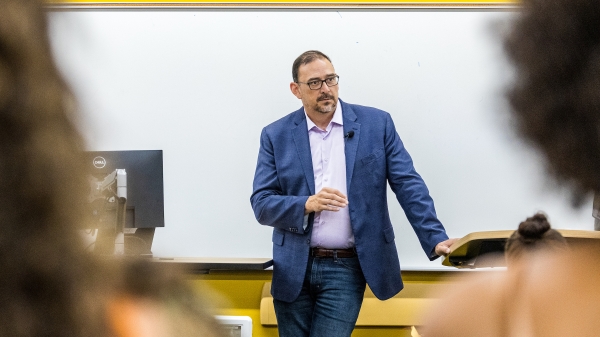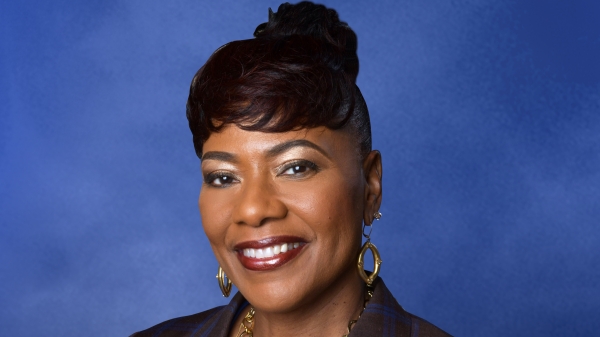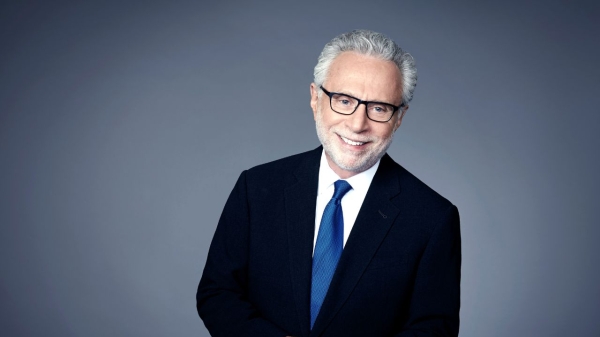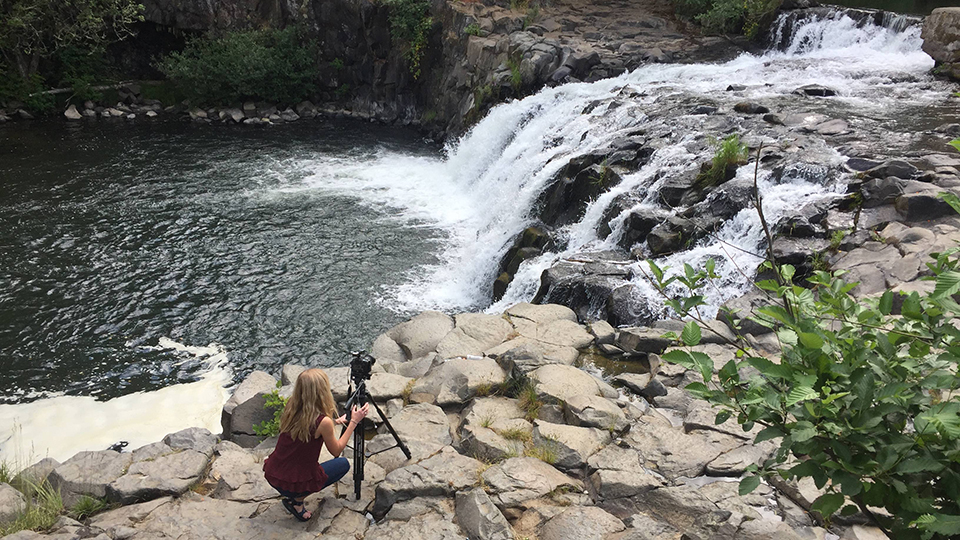Student reporting investigation finds as many as 63 million in US exposed to potentially unsafe drinking water

The Carnegie-Knight News21 program, a national multi-university reporting initiative headquartered at Arizona State University’s Walter Cronkite School of Journalism and Mass Communication, released a major multimedia investigation Monday into water pollution and its impact on health in the U.S.
Twenty-nine students from 18 universities traveled to 25 states, interviewing hundreds of individuals and collecting thousands of pages of state and federal statutes and records for “Troubled Water.”
The project found as many as 63 million people — nearly a fifth of the country — were exposed to potentially unsafe water more than once during the past decade, according to an investigation of 680,000 water-quality and monitoring violations from the Environmental Protection Agency. The project is at troubledwater.news21.com.
“Troubled Water” includes a 26-minute documentary, more than a dozen multimedia stories as well as databases and data visualizations documenting the issues surrounding water pollution. Portions of the investigation will be published by major media partners. Last year’s News21 investigation included The Washington Post, nbcnews.com, USA Today Network, The Dallas Morning News and The Philadelphia Inquirer, plus a number of nonprofit online news sites.
“Water is a universal concern, which makes it important to everyone, whether you live on a ranch in Texas or on a Native American reservation in Wyoming,” said Jacquee Petchel, News21 executive editor. “But one of the reasons we decided to investigate water quality nationally is because so many rural and disadvantaged communities often are the most impacted by contaminated water. We saw this across the country from tiny towns in Louisiana and Vermont to urban areas like Milwaukee and East Chicago, Indiana.”
Elizabeth Sims, an Ethics and Excellence in Journalism Foundation Fellow, films at Scott Mills Falls in Scott Mills, Oregon, for this year's Carnegie-Knight News21 investigation. Photo by Agnel Philip/News21
News21 was established by the Carnegie Corporation of New York and the John S. and James L. Knight Foundation to demonstrate that top journalism students can produce in-depth reporting and multimedia innovations. This year’s project also includes support from Ethics and Excellence in Journalism Foundation, Hearst Foundations, Donald W. Reynolds Foundation, Louis A. “Chip” Weil, Diane Laney Fitzpatrick, Fred W. Smith and Dallas Morning News.
Petchel supervised the student reporters’ investigative project with award-winning journalists who serve on the faculty of the Cronkite School, including Leonard Downie Jr., former executive editor of The Washington Post and Weil Family Professor of Journalism; Christina Leonard, director of the Reynolds Business Reporting Bureau; and Pulitzer Prize winner and Professor Steve Doig. News21 staff also included web application developer Bhuvan Aggarwal, data visualization developer Hari Subramaniam, digital production editor Rian Bosse, copy editor Alex Chihak and visuals co-editors Alex Lancial and Jim Tuttle.
Work on the project started in January with a video-conference seminar on water-pollution issues taught by Downie and Petchel. Students heard from experts on the topic, analyzed data, researched topics and conducted interviews across the country.
“We chose ‘Troubled Water’ as this year’s topic because the drinking water of so many millions of Americans from coast to coast is now or has in recent years been contaminated in various ways,” Downie said. “Some news media have focused on the problem in some communities, such as the lead contamination in Flint, Michigan, drinking water, but News21 is the first to investigate all the sources and impacts of water pollution nationwide, with its own data analysis and on-the-ground reporting in every region of the country. The student journalists produced deeply reported stories and vivid photographs and video for the project’s many media partners around the country, plus an in-depth documentary.”
From late May to the end of July, the student journalists completed a 10-week fellowship, working out of Cronkite School newsroom on the ASU Downtown Phoenix campus. They crossed the country in multimedia reporting teams, examining the impact of industrial pollution, farming waste, pipe deterioration and the cost of contamination, among issues.
Fellow Brandon Kitchin, a junior at Texas Christian University in Fort Worth, traveled across the South from Texas to Florida, shooting photos and videos and interviewing numerous individuals for the investigation. Kitchin’s work focused on environmental justice issues in the South, uncovering stories of African-American communities fearful of crumbling pipes and tainted drinking water.
“There’s a major disconnect between what the data says, and what the people up top are saying,” Kitchin said. “It blows your mind.”
The investigation found that many local water-treatment plants, especially in small, poor and minority communities, cannot afford the equipment necessary to filter out contaminates, which can include arsenic, found naturally in rock, chemicals from factories and nitrates and fecal matter from farming.
“We spent months investigating the enormous impact of industrial dumping on water quality, which is far more pervasive than many people realize,” Petchel said. “I consider this an important public-service project that we hope will resonate with every household in America.”
Fellow Jasmine Spearing-Bowen, a graduate student at the Cronkite School, traveled to northeastern Oklahoma to investigate the Tar CreekSuperfund site, a 40-square-mile area previously minded for zinc. When the mines shut down in the 1970s, she said the effects of the pollution were so devastating that residents of four towns had to be relocated.
Spearing-Bowen said working on the project provided valuable professional experiences that will help her when she graduates.
“Having the experience of doing an investigation like this is amazing,” she said. “Our group of fellows has been great.”
Over the past eight years, Carnegie-Knight News21 projects have included investigations into voting rights, post-9/11 veterans, marijuana laws and guns in America, among other topics. The projects have won numerous awards, including four EPPY Awards from Editor & Publisher magazine, the Student Edward R. Murrow Award for video excellence and a host of honors from the Society of Professional Journalists and the Hearst Awards Program, considered the Pulitzer Prizes of collegiate journalism.
The universities participating in the 2017 Carnegie-Knight News21 program are ASU, American University, Dublin City University, Elon University, George Washington University, Hofstra University, Kent State University, Louisiana State University, St. Bonaventure University, Syracuse University, Texas Christian University, University of Alabama, University of British Columbia, University of North Texas, University of Oklahoma, University of Southern California, University of Tennessee and University of Texas at Austin.
Carnegie-Knight News21 fellows are supported by their universities as well as a variety of foundations, news organizations and philanthropists. This includes The Arizona Republic, The Dallas Morning News, the Donald W. Reynolds Foundation, Ethics and Excellence in Journalism Foundation, Veronica Guerin, Hearst Foundations, John S. and James L. Knight Foundation, John and Patty Williams and Louis A. “Chip” Weil.
The fellows are:
- Fraser Allan Best, ASU, Hearst Fellow
- Bryan Anderson, Elon University
- Macee Beheler, University of Oklahoma, Ethics and Excellence in Journalism Foundation Fellow
- Bryn Caswell, University of Alabama
- Claire Caulfield, ASU, Chip Weil Fellow
- Maria Esquinca, ASU, Ethics and Excellence in Journalism Foundation Fellow
- Jordan Houston, American University, Knight Foundation Fellow
- Andrea Jaramillo, ASU, Hearst Fellow
- Lauren Kaljur, University of British Columbia
- Brandon Kitchin, Texas Christian University
- Rachel Konieczny, St. Bonaventure University
- Jenna Miller, ASU, Reynolds Fellow
- Amy Molloy, Dublin City University, Veronica Guerin Dublin City University Fellow
- Elissa Nuñez, George Washington University
- Fionnuala O’Leary, Dublin City University, Veronica Guerin Dublin City University Fellow
- Agnel Philip, ASU, Don Bolles/Arizona Republic Fellow
- William Taylor Potter, Louisiana State University
- Alexis Reese, University of North Texas, Dallas Morning News Fellow
- Corinne Roels, ASU
- Michael M. Santiago, Syracuse University
- Karl Schneider, Kent State University
- Elizabeth Sims, University of Oklahoma, Ethics and Excellence in Journalism Foundation Fellow
- Briana Smith, Hofstra University
- Jasmine Spearing-Bowen, ASU, Reynolds Fellow
- Adrienne St. Clair, ASU, Reynolds Fellow
- Nicole Tyau, ASU, Hearst Fellow
- Jackie Wang, University of Texas at Austin
- Chelsea Rae Ybanez, ASU, Hearst Fellow
- Bliss Zechman, University of Tennessee, John and Patty Williams Fellow
More Law, journalism and politics

Arizona secretary of state encourages students to vote
Arizona Secretary of State Adrian Fontes looked right and left, taking in the more than 100 students who gathered to hear him speak in room 103 of Wilson Hall.He then told the students in the Intro…

Peace advocate Bernice A. King to speak at ASU in October
Bernice A. King is committed to creating a more peaceful, just and humane world through nonviolent social change.“We cannot afford as normal the presence of injustice, inhumanity and violence,…

CNN’s Wolf Blitzer to receive 41st Walter Cronkite Award for Excellence in Journalism
Wolf Blitzer, the longtime CNN journalist and anchor of “The Situation Room With Wolf Blitzer,” will accept the 41st Walter Cronkite Award for Excellence in Journalism, Arizona State University has…
